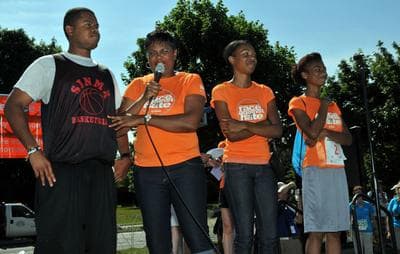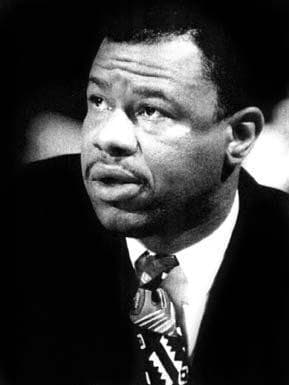Advertisement
Memories Of A Dad: Coach Byrdsong, Killed In Hate Crime
Resume
On Father's Day Sunday about 5,000 people will participate in the 14th annual Race Against Hate in Evanston, Illinois.
The race honors a man named Ricky Byrdsong, the first African-American coach of the men's basketball team at Northwestern University. He was murdered by a member of a white supremacist group on a street near his home in Skokie, Illinois, on July 2, 1999.

Byrdsong was killed while he was jogging with Ricky Jr. and Kelley, two of his three young children.
This is the story of how their father made an impression on me when I was also a young father.
In the summer of 1996 when my first son Casey was 10 and I was 31, I took him to the father-son basketball camp at Northwestern University.
Casey was a basketball junkie just like I was, so this was a thrill for both of us. We bunked in the college dorms and went to clinics that were run by the Northwestern players.
Now if you've never been to the Northwestern campus, it's lovely. It sits on the shores of Lake Michigan and Casey and I spent a sunny weekend afternoon on the beach on one of the days we were there.
The Northwestern Wildcats play their regular season games in an old gymnasium called Welsh-Ryan Arena, and the highlight of this father-son weekend was on Saturday night. We got to play on that court.
Coach Byrdsong was there with us and we had a blast. All of the kids just running around like crazy and the dads trying not to get hurt.
I remember thinking, here was this Big Ten basketball coach and he was spending his Saturday night playing ball with me and my son and all the other fathers and sons at the camp. Sure he was probably getting paid to organize the camp, but I have never forgotten the fact that he paid attention to us and spoke to my son that night.
"He was so busy, but he always found time to take us to Northwestern and shoot around with us every Sunday."
Kelley Byrdsong
My story is not one that most people know about Ricky Byrdsong. The one most people know is from the night of February 7, 1994, when Northwestern was playing a basketball game at the University of Minnesota.
It was pretty clear the Wildcats were going to lose and coach Byrdsong sort of lost it. He took what he would later call "a walk on the wild side."
As columnist Mike Downey recalled in an article he wrote about that night after Byrdsong was killed, the coach turned his team over to an assistant, went up into the stands, shook hands with the fans and high-fived the Minnesota Gophers' mascot.
He finally took a seat in the aisle until an usher asked him to move. After the team got back to Evanston that winter night, his wife Sherialyn requested a leave of absence for her husband.
Northwestern fired Ricky Byrdsong with a handful of games left in the 1996-97 season. His coaching career was over. In 2009, students at Northwestern University's Medill School of Journalism made a documentary about Byrdsong's life called "Fly Like A Byrd."
Ricky Byrdsong was 43 when he was gunned down. When he died, I thought about the night when he was so generous with his time and his love for the game with me and my son.
This week, I spoke to his daughter Kelley. She’s now 24. Kelley was with her dad when he was killed but the things she remembers about him are moments like we had with her dad.
"He was so busy, but he always found time to take us to Northwestern and shoot around with us every Sunday. He'd take a lot of my friends and I to the park in our neighborhood and shoot around. As a dad he was always there, even when he wasn't there, because he was coaching and gone a lot, but even then we could feel his presence.
"I don't think looked he looked at himself as a Big Ten basketball coach. I just think he was a coach and he wanted to help people, whether it was his players or their families or people he didn't know and that's what he did."
In other words, he was a dad.
Alex Ashlock is a producer for Here & Now and director of the show.
This segment aired on June 14, 2013.